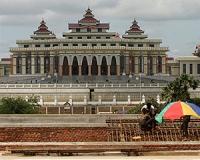| . |  |
. |
Buenos Aires (UPI) Mar 30, 2011 Argentina has bestowed its press freedom award on Venezuelan President Hugo Chavez despite the country's draconian treatment of independent or privately owned media companies. Just when international press freedom campaigners and human rights organizations renewed condemnation of Venezuelan attempts to dismantle independent media companies, the University of La Plata heaped praise on Chavez for dismantling "media monopolies" and fostering popular mass communications. Chavez shut down media companies that voiced criticism of his government, in measures reminiscent of government-led crackdown on the media in Argentina. Frequent quarrels between media editors and Argentine President Cristina Fernandez de Kirchner have led to mutual mistrust in Argentina. The University of La Plata defended the award, conferred on Chavez when he visited Argentina this week. A university statement said the Rodolfo Walsh Award went to Chavez for "his unquestionable and authentic commitment to defending the liberty of the people, consolidating Latin American unity and defending human rights, truth and democratic values." The award honors an Argentine investigative journalist who disappeared during military rule in the 1970s. Walsh co-founded Cuba's Prensa Latina press agency but later joined Argentina's leftist Montoneros guerrilla group. He died in a military ambush in 1977. Chavez welcomed the honor and told a crowd of students that Venezuela was promoting "a new dynamic of communication and information free from the media dictatorship of the bourgeoisie and the empire" -- his term for the United States. Chavez has been promoting Venezuela's Telesur network as a state-funded alternative to private television stations across Latin America. After shutting down many of the country's privately owned media companies, Chavez embarked on an expansion of state-funded media to help support ideological advancement of his Bolivarian revolution. Oil-rich Venezuela has been trying to emerge from three years of recession, often blamed by critics on Chavez's economic policies. The head of the Argentine Parliament's commission for freedom of expression, Silvana Giudici, told news media the award to Chavez was a contradiction. Chavez, rebutting critics, said he was proud to be the recipient even though he was considered a "dictator" who didn't deserve the honor. "One must fight the media dictatorship," he said. "The dominant classes always manipulate the communications media and trick the people through powerful psychological campaigns." In 2008 Venezuelan authorities forced the opposition RCTV channel off air by refusing to renew its broadcast license. The Venezuelan telecommunications agency then ordered cable companies to drop RCTV International in 2010 for refusing to carry Chavez's speeches and other mandatory programming. The government also cited licensing issues in forcing 32 radio stations and two small TV stations off the air. Venezuela's only remaining TV channel still critical of Chavez, Globovision, is also under pressure. Its majority owner fled the country rather than be jailed on charges described by critics as bogus. Venezuela's major independent newspaper El Nacional criticized the award in an editorial. "That a South American university doesn't know about this grave situation and dares to honor this military leader with the Rodolfo Walsh Prize says much about the destruction of values that the Kirchners have imposed on the Argentine nation," the newspaper said. "Walsh was a victim of military repression and his example is now stained absurdly." University officials defended the award, arguing it aimed to highlight the role played by Chavez in emancipating Venezuelans previously denied access to the media. It said the award didn't mean the university agreed with all of Chavez's policies. Human Rights Watch and other international campaigners have frequently listed examples of suppression of the press in Venezuela.
Share This Article With Planet Earth
Related Links Democracy in the 21st century at TerraDaily.com
 Scant hope for change in Myanmar 'civilian' rule
Scant hope for change in Myanmar 'civilian' ruleYangon (AFP) March 31, 2011 Myanmar's attempt to rebrand itself with a nominally civilian government was met with scepticism at home and abroad on Thursday, with critics fearing army power has merely moved into the shadows. Newspapers were sold out on the streets of Yangon a day after former general Thein Sein was made president and the feared junta was disbanded following nearly half a century of military rule. Bu ... read more |
|
| The content herein, unless otherwise known to be public domain, are Copyright 1995-2010 - SpaceDaily. AFP and UPI Wire Stories are copyright Agence France-Presse and United Press International. ESA Portal Reports are copyright European Space Agency. All NASA sourced material is public domain. Additional copyrights may apply in whole or part to other bona fide parties. Advertising does not imply endorsement,agreement or approval of any opinions, statements or information provided by SpaceDaily on any Web page published or hosted by SpaceDaily. Privacy Statement |